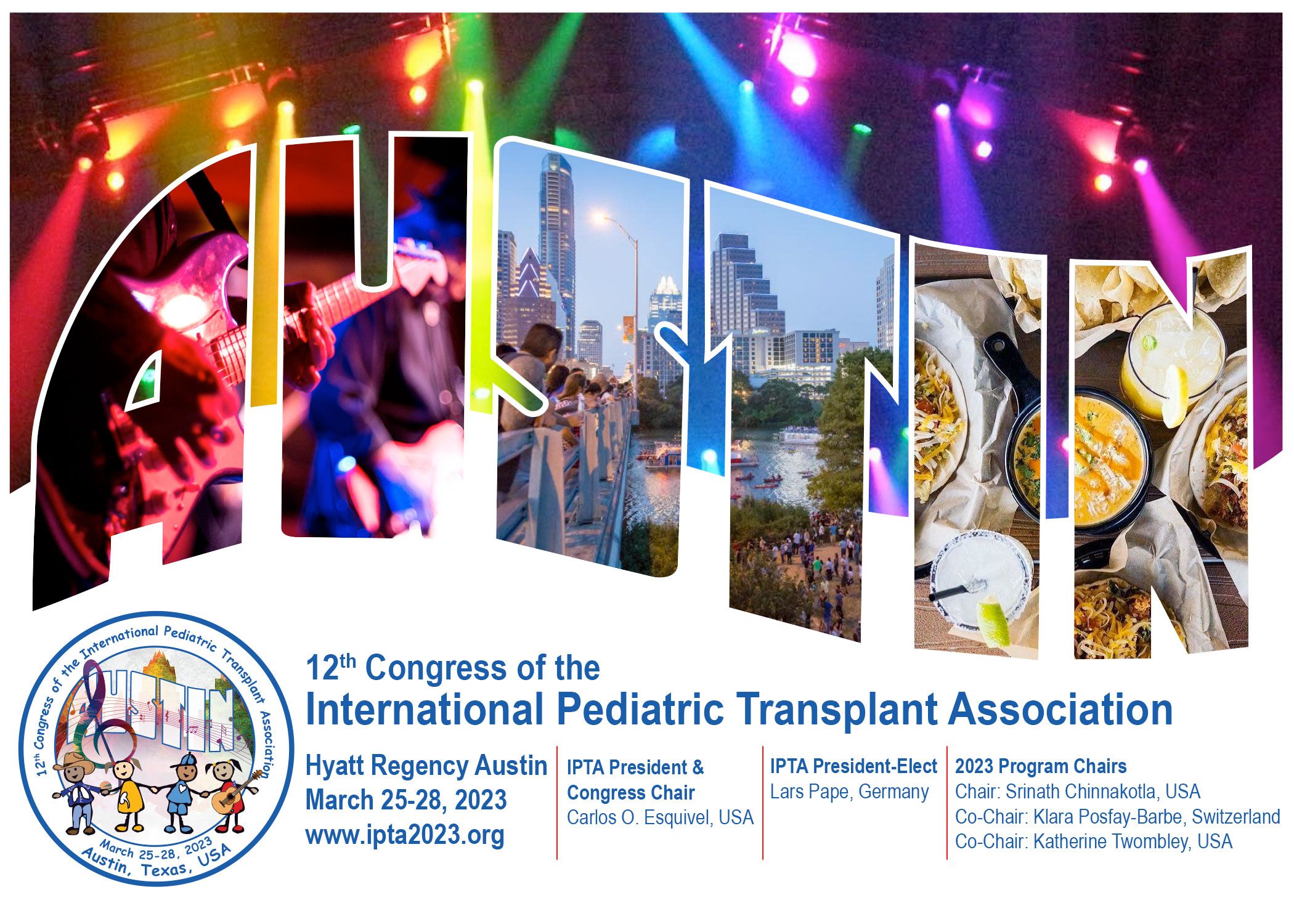

This is the first IPTA newsletter of 2023, but my last one as the President of IPTA. Serving as your president for the last two years has been an enriching experience and a privilege, and for this, I am very grateful to each one of you. Together we have addressed significant challenges mostly caused by the COVID-19 pandemic that resulted in us postponing the IPTA 2021 Congress in Prague twice. This meeting was eventually changed to a virtual meeting and was a tour de force effort. The Congress was a smashing success, thanks to Mignon McCulloch, the IPTA Executive Council team, and the TTS staff.
The 12th Congress of IPTA is around the corner, and we are looking forward to meeting with you in Austin at the end of March. The meeting will take place March 25th -28th at the Hyatt Regency nestled on the shores of beautiful Lady Bird Lake. Thank you to the Chair of the Scientific Advisory Committee, Srinath Chinnakotla, the Co-Chairs Katherine Twombley, and Klara Posfay-Barbe, as well as the rest of the planning committee for their diligent efforts to ensure that the program provides an informative and engaging educational activity with world renowned experts. We also look forward to presenting the IPTA Society and Scientific awards.
There will be social activities during the congress. Certainly, don’t miss the IPTA Social Networking Event on Sunday, March 26 | 19:00-22:00 at the Chateau Bellevue Castle where we will eat, drink wine and dance - and bring all your friends and wear your cowgirl/cowboy outfit! This exclusive IPTA extravaganza networking event will showcase the great Southern hospitality for which Austin is known. And, if you have time, I encourage you to extend your stay to explore all that the city of Austin offers such as art galleries, museums and outdoor sports activities, as well as live music, amazing restaurants and of course, the typical Texas rodeo! If you have not registered, there is still time to do so on the IPTA 2023 Congress website. Remember, the registration will include IPTA membership for one year.
As the term draws to a close, one finds moments to reflect on my involvement with IPTA over the years. Becoming a transplant surgeon for children was something I never expected. Soon after I arrived in Pittsburgh, my mentor Tom Starzl asked me to take care of the pediatric patients, because as he put it: “You can be pretty good at it”! From that moment on, I began a journey which has enriched my life enormously. The field of liver transplantation began with children suffering from a fatal disease, biliary atresia, and they became the first ‘human experiments’ for liver transplants. The evolution of the field has occurred at a blinding speed, but pediatric patients still face big challenges. In poor or mid-resourced countries, organ transplantation may not be available for children. Even in well-resourced countries, like the USA, children are at a disadvantage in organ allocation schemes. Many immunosuppressive medications we use within our pediatric practice have not had proper clinical trials in children. These are just a couple of examples, among many others, why children with organ failure or after transplant belong to a vulnerable population. Thus, we need to support IPTA.
Advocacy, resolving ethical issues, creating educational guidelines for treatment of organ failure and post-transplantation, and developing tools to help children transition to adults are some of the initiatives where IPTA will have the biggest impact worldwide. Many of these goals can be accomplished through Outreach efforts. I am proud to being able to raise funds to support such outreach activities. Furthermore, IPTA is the only multidisciplinary organization dedicated to multiorgan transplantation with members that represent all the specialties involved in the care of these patients, including the allied health personnel who play a key role often providing the link between physicians, patients and their families.
Finally, I am humbled and honored to have served as your President for the last two years. I could not have done the work without the immense help I receive from the TTS staff, in particular Katie Tait, Isabel Stengler, and Catherin Parker, as well as the IPTA Executive Committee and the IPTA Council. I am delighted to pass the torch to our incoming President Lars Pape, from whom we can expect great things during his tenure.
Yours faithfully,
Carlos O. Esquivel
IPTA President, 2021-2023
Past Issues
IPTA Newsletters
- IPTA Newsletter - December 2025
- IPTA Newsletter - October 2025
- IPTA Newsletter - June 2025
- IPTA Newsletter - March 2025
- IPTA Newsletter - December 2024
- IPTA Newsletter - October 2024
- IPTA Newsletter - May 2024
- IPTA Newsletter - February 2024
- IPTA Newsletter - November 2023
- IPTA Newsletter - September 2023
- IPTA Newsletter - May 2023
- IPTA Newsletter - March 2023
- IPTA Newsletter - December 2022
- IPTA Newsletter - October 2022
- IPTA Newsletter - July 2022
- IPTA Newsletter - May 2022
- IPTA Newsletter - December 2021
- IPTA Newsletter - October 2021
- IPTA Newsletter - June 2021
- IPTA Newsletter - October 2020
- IPTA Newsletter - June 2020
- IPTA Newsletter - March 2020
- IPTA Newsletter - December 2019
- IPTA Newsletter - September 2019
- IPTA Newsletter - July 2019
- IPTA Newsletter - April 2019
- IPTA Newsletter - December 2018
- IPTA Newsletter - September 2018
- IPTA Newsletter - June 2018
- IPTA Newsletter - March 2018
- IPTA Newsletter - December 2017
- IPTA Newsletter - September 2017
- IPTA Newsletter - December 2016
- IPTA Newsletter - September 2016
Contact
Address
The Transplantation Society
International Headquarters
740 Notre-Dame Ouest
Suite 1245
Montréal, QC, H3C 3X6
Canada
Используйте Вавада казино для игры с бонусом — активируйте промокод и начните выигрывать уже сегодня!








